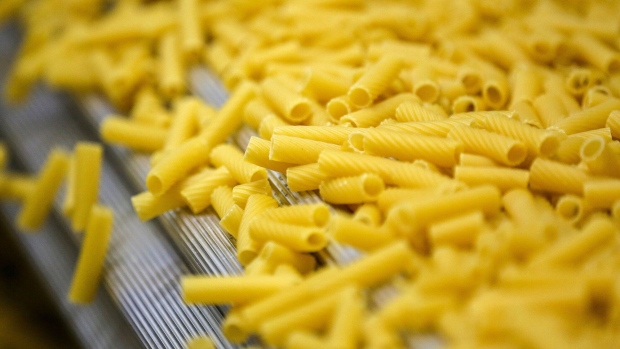Mar 29, 2024
Rush of Asset-Seizure Cases Puts Putin’s Tycoons on High Alert
, Bloomberg News

(Bloomberg) -- Russian businesses are seeking guarantees from the Kremlin that they won’t face asset seizures and privatization reviews amid a growing list of cases where assets owned by local tycoons for decades are being nationalized.
Russia is seeing more cases of assets owned by local tycoons since the 1990s being nationalized, prompting businesses to seek guarantees from the Kremlin that they won’t face privatization reviews.
“The creeping redistribution of property has begun,” said Oleg Vyugin, a former first deputy governor of Russia’s central bank. “Putin said a new elite is needed. The current elite, owners of significant assets, is being screened based on the principle of loyalty.”
Prosecutors filed at least 55 cases seeking to nationalize assets since the start of Moscow’s invasion of Ukraine two years ago, according to research published in December by the RBC newspaper in Moscow.
The latest example is Makfa JSC, Russia’s largest pasta producer. Prosecutors have filed a court case in Chelyabinsk, central Russia, to wrest control of the company, Kommersant newspaper reported on Friday.
Read more: Putin Has Russian Elite in a Frenzy Over Their Political Futures
The total value of the assets is 46 billion rubles ($497 million) and they’re controlled by the families of Mikhail Yurevich, a former governor of the Chelyabinsk region, and former Duma deputy Vadim Belousov.
The sweeping privatization that started in the 1990s allowed many Russian businessmen to amass significant fortunes. Many have tried since then to diversify their businesses by buying assets in Europe or the US and registering their holdings abroad, but President Vladimir Putin’s war in Ukraine upended their plans.
At Mafka, prosecutors claimed Yurevich and Belousov were de-facto controlling and managing the business when they were officials, which is banned by Russian law. Both left Russia several years ago after separate corruption-related cases were opened against them, but continued to manage their business from Cyprus and UK, according to the newspaper. Belousov was sanctioned by the UK government in 2022.
Read more: Putin Warns Russia Won’t Stop After Predictable Election Win
With most Russian billionaires having been sanctioned over the past two years, the next concern is which decades-old privatization decisions might be reversed.
The topic is so hot that Putin addressed it during a meeting with staff of the Prosecutor General’s Office on March 26.
The Russian leader said efforts to return “a number of large enterprises and property complexes to state ownership” were important, while urging that the such moves should be lawful and justified.
Read more: Dubai Loses Allure for Russians on Costs, US Sanctions Pressure
“I would like to immediately outline my position here: we are not talking about any de-privatization or nationalization of the economy,” Putin said. “There can be no talk about it.”
The Prosecutor General’s Office didn’t immediately respond to a request for comment from Bloomberg News.
The Russian Union of Industrialists and Entrepreneurs, a lobby group of the country’s biggest businesses and tycoons, has developed amendments to legislation aimed at protecting the rights of business owners from de-privatization, Alexander Shokhin, the union’s president, told the media in February.
Despite Putin’s reassurances, such moves are “not followed by public actions aimed at emphasizing the importance of the institution of property,” said Mikhail Vinogradov, head of the St. Petersburg Politics Foundation. “There is no political will to impede this process at the moment.”
This year will show the scale of the process, said Natalya Zubarevich, a specialist on Russia’s regions at Moscow State University. “Once the flywheel of the prosecutor’s office has spun up, it is quite difficult to stop it.”
Read more: Putin’s Bid to Reassert Kremlin Authority Is Showing Cracks
Quite often the assets in question are needed for the defense industry, Zubarevich said.
In February, the Sverdlovsk regional court supported prosecutors’ claims and ordered the transfer to the state of three plants from the group led by Chelyabinsk Electrometallurgical Plant.
The group, which accounts for about 80% of Russian ferro-alloys output, had been controlled by the family of entrepreneur Yury Antipov and his business partner since the early 1990s.
The value of the claim was increased this week to 105 billion rubles from 25.8 billion rubles as prosecutors also sought to claw back dividend payouts.
Antipov was briefly detained, but released on bail. His former business may be transfered to Rostec State Corp., which is headed by close Putin’s ally Sergey Chemezov, RBC reported.
Read more: Russia Seizes Top Car Dealership Owned by Putin Critic’s Family
The owners who live outside Russia are at high risk, including if they speak against the war, said Tatiana Stanovaya, founder of R.Politik, a political consultancy, and a senior fellow at the Carnegie Russia Eurasia Center.
Russia in December also seized control of one of the country’s biggest car dealerships, which had been owned by the family of Sergey Petrov, a wealthy Kremlin critic now living in Austria.
Andrey Melnichenko, who has an United Arab Emirates passport, is a rare case of a tycoon who managed to settle a dispute with prosecutors. The billionaire was allowed to keep some energy assets after his company agreed to contribute funding toward educational charity projects.
Even minority investors aren’t safe. A court in Perm approved the seizure of shares from over 2,000 minority investors of the Solikamsk magnesium plant, a rare earth metals producer, after its 1992 privatization was declared illegal by a court in 2022. Control was transfered to the state corporation Rosatom.
“The authorities now look at a business in terms of whether it is loyal or disloyal,” Vyugin said. “Those which are considered disloyal may see their assets ending up in other people’s hands.”
©2024 Bloomberg L.P.


